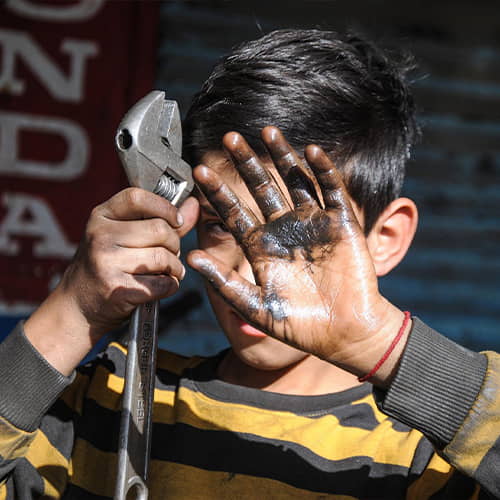Grown Up too Soon: The Devastating Effects of Child Labor
Children should be asked questions about what they want to be when they grow up or what class at school they like the best. Children should not be treated for machete wounds from working long, difficult hours in sugar plantations. Their childhood stolen, these youth grow up with the lifelong negative effects of child labor.
No parent plans on pulling their child from school and sending them into day labor. It’s a difficult, often emotional decision for parents to make in the midst of extreme poverty that threatens their very survival. Families who live at or below the World Bank’s poverty line of $1.90 per day are often faced with horrific decisions about their children’s futures.1 With no marketable skills and often no literacy or numeracy, adults must take jobs that anyone can do, such as brick making, farm or plantation work, or other labor jobs. These jobs rarely sustain families. One of the first costs to be cut is often fees related to attending school, preventing the child from continuing in school. Soon, that child is pulled into whatever the parents are doing to help the family survive.
Without schooling, there is little to no chance for that child to escape this same cycle of poverty and child labor. World Vision estimates that at the start of 2020, 63 million girls and 97 million boys were in child labor. Of that, they also have determined that one in three of those children are not in any form of schooling.2
The International Labor Organization defines child labor as “work that deprives children of their childhood, their potential and their dignity, and that is harmful to physical and mental development.”3
The causes and effects of child labor do not follow a specific formula. The example given above is one possible scenario of how a child might come to be employed. Poverty and poor schooling options are two of the greatest risk factors,4 but other causes include debt bondage, deceitful human traffickers and forced recruitment into the armed forces. There are even countries whose governments not only condone certain forms of child labor but require it during harvest time of major crops.5
The effects of child labor depend on the industry they are in, but deprival of a childhood for development and growth are across the board. General effects include possible injuries, exhaustion, desocialization and isolation. The emotional effects of child labor are unseen and often deeper. They include depression, suicidal thoughts, hopelessness, aggression and more.6
International Labor Rights Forum reports,
“Child labor also affects the overall social development of children, since they do not get to spend time with others their own age or even enough time with family members. Children need to build personal positive relationships in order to thrive and feel confident.”7
Click here, to read more about this article.
Click here, to read more blogs in Gospel for Asia.Com


Comments
Post a Comment